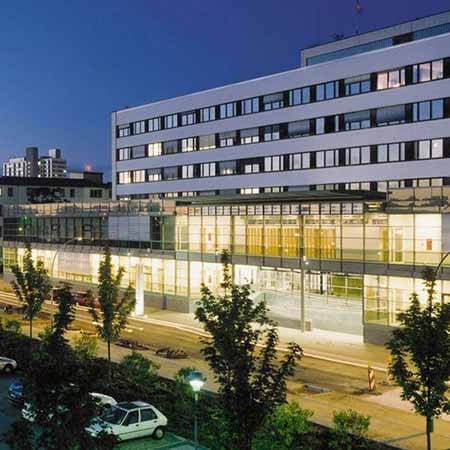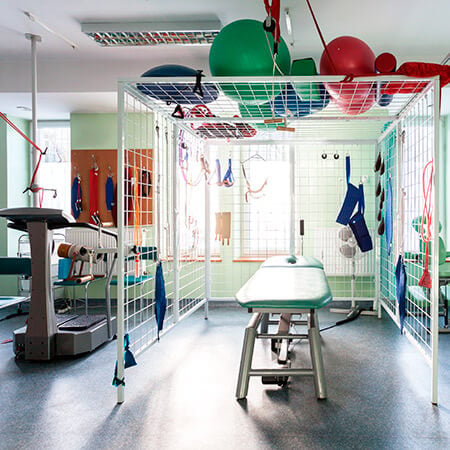Epilepsy
Epilepsy is one of the most common neurological diseases in the world. At least 5% of people have 1 or more epileptic seizures episodes during their life. Approximately 0.5%-1% of patients have the diagnosis of epilepsy. This disease affects about 3-5% of the population in some regions. According to the WHO data, 75% of patients don’t receive adequate medical care.
The Booking Health portal presents 40 German clinics specializing in epilepsy treatment
Show all clinics
Diagnostics of Epilepsy
Epilepsy is a clinical diagnosis established on the basis of the anamnesis data and physical examination. The diagnosis is confirmed in presence of 2 and more epileptic seizures episodes which are not related to specific causes and provoking factors.
The following instrumental diagnostics methods help to establish a diagnosis:
- Electroencephalogram
- EEG monitoring is performed to determine the functional activity of the brain in dynamics
- Imaging methods, such as CT and MRI (to detect aneurysms, tumours and other possible causes of epileptic seizures)
Epilepsy is NOT diagnosed if:
- The epileptiform activity of the brain on the EEG is not accompanied by epileptic seizures
- Epileptic seizures are triggered by a clearly defined cause (central nervous system tumors, acute period of the brain injury)
Best clinics for the epilepsy diagnostics in Germany:
Treatment of Epilepsy
Most patients receive conservative treatment in the case of epilepsy. Doctors prescribe medications that help to stop seizures and bring the quality of life back to normal one. Conservative treatment is effective in 70-80% of patients.
There are cases of the pharmacotherapy-resistant epilepsy (impossibility of complete cessation of seizures with drugs). 20-30% of all patients react to medications poorly or do not react at all. The number of resistant forms decrease, as new drugs are constantly being developed for the treatment of epilepsy.
Stable result can be achieved with the help of surgical treatment. Nowadays, the following methods of treatment are applied:
- Removal of the epileptogenic brain tissue. Various operations are performed like lobectomy, cortical totectomy, hemispherectomy, amygdalo-hippocampectomy and others.
- Callosotomy is a surgery aimed at the corpus callosum transection. As a result, the left and right hemispheres of the brain are completely separated.
- Stimulation of the vagus nerve. A device that stimulates the vagus nerve is put under the skin of the patient. In 50% of cases this leads to a decrease of seizure activity and the cessation of seizures.
- Neurostimulator implantation. This device is located directly near the epilepsy focus. It determines the functional activity of the brain and stabilizes it before the attack occurs.
Professionals in German hospitals can cure epilepsy with the help of the latest techniques. Neurosurgical interventions are very complex and require a highly skilled surgeon and state-of-art medical equipment. It is important that the operation not only ceases epileptic seizures, but also brings minimum neurological defects.
Therefore, many patients prefer medical tourism. They go to the clinics in Munich, Berlin and other German cities. Medical tourism allows you to get quality medical care, regardless of where you live.
Best clinics for the epilepsy treatment in Germany:


Rehabilitation after treatment of Epilepsy
Epilepsy is a chronic disease. The maintenance treatment is performed continuously in the case of epilepsy. Rehabilitation helps the patients to avoid the development of seizures and have a full, active life. There are several main directions of the rehabilitation, such as:
- Medical one, which includes the restoration of patient's health, normalization of body functions, stimulation of compensatory possibilities, elimination of the chronic pain, etc.
- Physical one, which is responsible for improving working capacity and tolerance for physical activities.
- Psychological one, which helps to eliminate the mental disorders which may occur as a result of a disease (phobias, depression, apathy), to increase the human motivation, and to adapt to the changed living conditions.
The most modern rehabilitation programs are used in Germany. They are adapted individually for each patient. Different specialists such as: epileptologists, therapists, psychologists, rehabilitators, kinesiotherapists, physiotherapists are involved in the rehabilitation process.
The following methods of rehabilitation are used:
- Dosed physical activity
- Training on the simulators and in the pool
- Physiotherapy
- Acupuncture
- Manual therapy
- Natural factors of the nature (mud, thermal waters, etc.)
Rehabilitation in the case of epilepsy always includes medicamentous support. The drug therapy program necessarily takes into account the individual sensitivity of the patient to the drugs. The physician constantly adjusts the course of treatment according to changes in the patient's health. Also, the counseling about proper nutrition and lifestyle is held.
Rehabilitation programs in Germany are designed for 2 weeks and more. If necessary, they can last much longer, up to several months. In this country, the patient is provided with qualitative care, accommodation in comfortable rooms and individually selected meals.
Rehabilitation programs in Germany show one of the best results in the world. Most patients successfully restore their employability and excellent health there. They remain physically active, return to the full social and family life.
Best clinics for neurological rehabilitation in Germany:
Author:
The article was edited by medical expert, board certified Dr. Nadezhda Ivanisova. For the treatment of the conditions referred to in the article you must consult a doctor; the information in the article is not intended for self-medication!
Sources:
The cost of services includes
Here you can find the cost of treatment for this disease at the German University Hospitals. Leave a request and we will provide a free consultation with a doctor and will start organizing the whole treatment process.
The program includes the following:
- Issuing of an invitation for getting a visa for treatment as quick as possible
- Fixing an appointment at a time convenient for you
- Preliminary organization of a comprehensive examination and discussion of the forthcoming treatment plan
- Arranging transfer from the airport to the hospital and back to the airport
- Provision of interpreting services and services of a personal medical coordinator
- If necessary, assistance in the organization of further surgical treatment
- Provision of a medical insurance against treatment complications covering up to 200,000 euro
- Preparation and translation of medical records and recommendations from the hospital
- Assistance in the subsequent communication with your attending physician, including consultations on repeated X-ray images through the unique medical document management system E-doc



